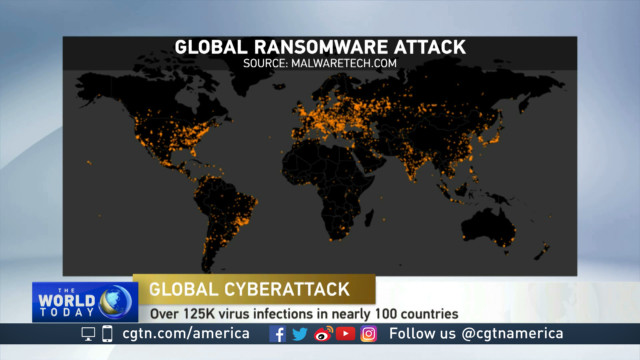A global hunt is underway for the hackers behind the massive cyberattack. Tens-of-thousands of computers were affected all over the world with this ‘ransomware,’ which freezes computers until a payment is made. Hospitals and business giants like Fed-Ex and Spain’s Telefonica were among those hit. Could we expect more cyberattacks this weekend?
CGTN’s Nathan King has more.

Companies, universities reeling from massive global cyberattack
A global hunt is underway for the hackers behind the massive cyberattack. Tens-of-thousands of computers were affected all over the world with this ‘ransomware,’ which freezes computers until a payment is made. Hospitals and business giants like Fed-Ex and Spain’s Telefonica were among those hit. Could we expect more cyberattacks this weekend? CGTN’s Nathan King has more.ood news is that the spread of the ransomware seems to be slowing. The bad news is that more computer attacks could come soon, and no one knows yet just who is behind it.
The malicious software crippled several British hospitals, hit Spain’s biggest telecoms firm and global delivery giant FedEx, and many other companies and government agencies. It spread quickly throughout Asia and Europe hitting across populated continents–more than 125,000 infections, about 100 countries in all.
And because the malware contained a ransom note asking for between 300 and 600 dollars before hackers would unlock computers, experts believe this attack more likely came from an individual rather than a state sponsor.
“Absolutely, straight-up organized criminality, absolutely done for profit,” says Ben Rapp, CEO of IT firm Managed Networks.
One published report said experts predicted the hackers could make more than a billion dollars when all is said and done.
Officials have called the blackmail attack unprecedented in scale, and while the attack is slowing after a British researcher found way to battle the code, there are fears the hackers could tweak the program and unleash it once again.
Cyber security experts say the best defense is to update your operating system, and don’t open suspicious emails.
“Essentially, the first thing to do is to train people not to open emails that they weren’t expecting and to be suspicious of the kind of language that’s used to create a sense of urgency,” says Rapp.
Experts believe this ransomware may have been stolen from the U.S. National Security agency. This has happened before. In 2010, the Stuxnet virus, believed to have been developed by the U.S. to attack Iran’s centrifuges at nuclear facilities, spread across the web and infected thousands of machines. It was then modified and used as a cyber weapon.
 CGTN America
CGTN America

